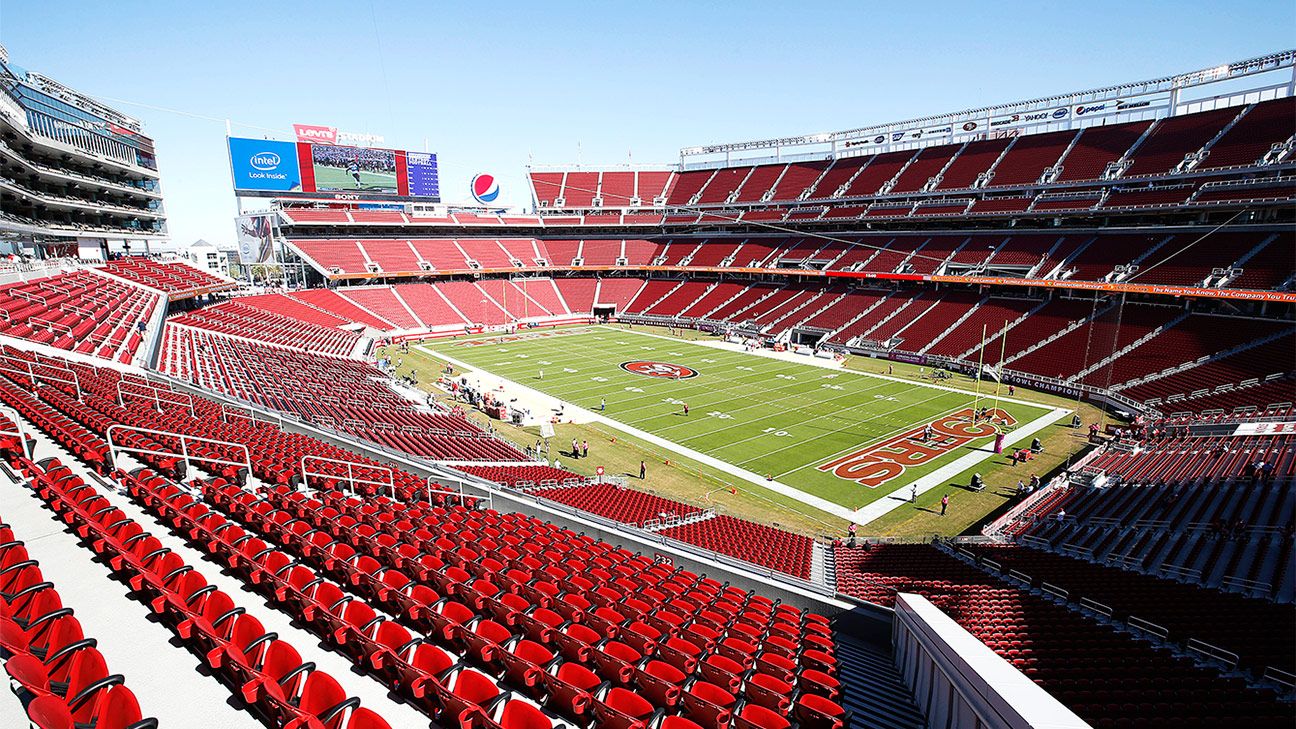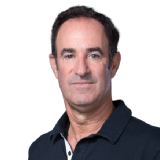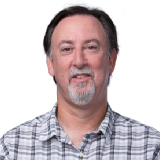A top Bay Area official who predicted sports will not resume before Thanksgiving told ESPN his county’s decision will be made by the local health officer — not the president or the leagues — and cautioned that more people will die if events are staged too early.
Dr. Jeffrey Smith, the chief executive for Santa Clara County — home to the 49ers, Sharks and three Division I universities — said it will take “a major miracle” for the NFL season to begin on time at Levi’s Stadium. For sports to resume even without fans, he said, the county will need assurances not only that the coronavirus is contained but that cities where visiting teams live also are following safe distancing.
“It puts the entire country at risk,” said Smith, a medical doctor and previously the chief medical officer of another Bay Area county. “The fundamental thing is sports is not a local event. If you have people traveling from all over and you have no way of knowing whether they’re infected or not — I mean, 50,000 of them in a stadium is not a good idea.”
Smith’s comments highlight the complexities that sports officials will face in trying to bring back live events. The decisions — and who ultimately makes them — will depend not only on containment of the virus and the urgency to reopen local economies but also the judgments of thousands of public health officials around the country.
In an interview with ESPN, Smith expanded on his prediction to the Santa Clara Board of Supervisors last week that sports will not return before Thanksgiving. His comments came not long after President Donald Trump held a conference call with league commissioners and said he expects the NFL to start as scheduled. Trump added to reporters, “I want fans back in the arenas.”
On Tuesday, Trump announced that all the major sports commissioners and several team owners were among those who would advise him on when to reopen the economy. He said, “We want to get our sports back so importantly. We have to get our sports back.”
The question of who ultimately decides when to resume sports comes amid a growing rift between Trump and state governors over who has the authority to reopen the economy. Govs. Gavin Newsom of California and Andrew Cuomo of New York have said the timing on sports would be dictated by health care professionals. Asked about the possibility of the NFL starting its season in August or September, Newsom said, “I’m not anticipating that happening in this state.”
Smith said the decision on allowing sports in Santa Clara will be made by the county public health officer, Dr. Sara Cody, who reports to him.
California law authorizes local health officers to “take any action … necessary to control the spread of the communicable disease.”
“Neither the federal government nor the state government have the legal authority to contravene the public health officers,” said Smith, who is also a lawyer. “The law was set up very specifically to make the public health officers’ decision an apolitical decision.”
In an interview, Cody agreed that the decision falls under her authority. She declined to give a specific date for when she believes it will be safe for sports to resume, but she said Smith’s assessment was “in the realm of possibility.”
“I don’t have a crystal ball to know how this pandemic is going to look down the line, but my sense is that we’re in it for the long haul,” Cody said. “The first thing we put in place was banning mass gatherings, and it’s probably the last thing we would resume.”
Smith said Trump’s call for sports to return as quickly as possible is, “A bad mistake.” If sports returned too soon, Smith said, “more people would die. It’s just as simple as that.”
Andy Baker-White, senior director of state health policy for the Association of State and Territorial Health Officials, predicted that questions around the reopening of venues such as stadiums, arenas and restaurants will likely produce “a lot of struggles between local governments, states and the fed.
“It can be kind of an onion to unwrap,” he said. “And then you throw politics on top of that. The virus needs people to be in close contact to spread. We need to be cautious in how we come back together. Each layer is going to have its own authority. Ideally, they’d be cooperating and on the same page.”
Santa Clara County has been influential in developing strategies to contain the coronavirus. After seeing a spike in cases in mid-March, Cody informed her counterparts in neighboring counties, and collectively they issued the nation’s first shelter-in-place order, covering 6.7 million people. The action has been credited with dramatically slowing the disease in the Bay Area.
Cody said the Bay Area’s health officers continue to work together and will likely decide issues such as sporting events in unison. That raises questions for the Warriors, the Giants, the A’s and Bay Area schools such as Stanford, Cal, San Jose State, Santa Clara, St. Mary’s and San Francisco State. “We decided early on we would take a regional approach,” Cody said. The San Francisco County health director declined comment, and the director for Alameda County — home to the A’s and Cal — did not respond to requests for comment.
As Santa Clara County’s top executive, Smith made national news last week when he made what seemed like a passing comment during an eight-hour virtual meeting of the board of supervisors: “Sorry to say, I don’t expect that we’ll have any sports games until at least Thanksgiving, and we’ll be lucky to have them by Thanksgiving.”
Smith said his projection is based on examining the impact of the lockdown in Wuhan, China, where the virus first appeared. The city, which has 11 million people, recently reopened after 76 days.
“And that was really severe, with a totalitarian government locking down people in their houses, which we’re obviously not going to do,” Smith said. “So that means probably extending the curve a month or two or even more for us. And even now, we don’t have a nationwide shelter-in-place program, so pretty soon you get to six, seven, eight months.”
Cindy Chavez, the board president, said she was surprised by Smith’s statement. Shortly after, she said, she received a call from the 49ers.
“There were no demands, no this or that,” said Chavez, declining to say who contacted her from the team. “It was very simply, ‘Did you guys make a formal decision?'”
In response to questions from ESPN, the 49ers pointed to a statement the team released last week: “While there is much debate regarding the appropriate time for the return of sports, our intent is to exercise great patience and make the most informed decisions regarding the health and wellness of all San Francisco 49ers and Levi’s Stadium employees, patrons, and the community at large. Our organization continues to collaborate with federal, state, and local health organizations, as well as our League office, to monitor the evolving developments regarding COVID-19.”
A Sharks spokesman told ESPN the team will be taking its cues from local health authorities on when to return “to ensure that our fans, players and staff are placed in a safe environment once play resumes.”
Chavez said Cody will make the final decision on when to end the shelter-in-place order and allow large gatherings. But she noted that Smith “is not some guy on a corner with a rolled-up newspaper, bellowing. He’s a lot more significant than that, and he’s reading the numbers.”
Supervisor Dave Cortese said he also was caught off-guard by Smith’s comments but did not take them lightly.
“Dr. Smith has a lot of credibility right now,” said Cortese, a sports fan who previously was general manager of a Continental Basketball Association team. “He’s not the public health officer, but he has extensive experience in health care.
“I know everybody is hoping that maybe football season coincides with us winning this fight against COVID, that somehow there’s just gonna be this fairy-tale script where we can all get back to normal just in time for the opening kickoff. But I guess [Smith] was trying to say, ‘Don’t get your hopes up, I need to tell you we’re still in dire straits and we might be for a long time.'”
Smith said the same difficult issues will be faced by “every other county or city with a stadium — they’re gonna be at great risk. I’m not an owner, and they never asked me their opinion, but they are not stupid people. I’m sure they realize that if they put their athletes and their fans at risk, they are losing billions of dollars. That means safety is the only option they have.”
The NFL season is scheduled to begin Sept. 11. But Smith believes starting earlier than late fall would require “a miracle, like a huge amount of herd immunity that is suddenly found, which is highly unlikely, or an immunization, which is highly unlikely, or a specific treatment, which is highly unlikely.”
The NBA announced it was suspending play on March 11, and all other sports followed suit. Since then, the NBA, Major League Baseball and the NHL have been considering a range of scenarios for returning to action, including playing at neutral sites in front of no fans and quarantining players and coaches in hotels for weeks. The NFL will hold a virtual annual draft next week, and late last week, commissioner Roger Goodell said, “The NFL is planning to play. That’s our hope, and that’s our planning to date.”
Goodell has said he believes the NFL “can help our country heal.” Smith, though, explained further why he thinks starting the NFL season as scheduled could be a problem.
“The reason why it’s flaring up in New York has to do with the fact that people are so close together,” he said. “Well, they’re not as close together as 50,000 people in a stadium are.
“Let’s imagine the 49ers playing a game against the Giants. How many people who come to watch the Giants, who are Giants fans, will be safe and not infected after this entire disaster that’s going on in New York? And how many people will feel comfortable going to a stadium with 50,000 people?”
Smith didn’t rule out the NFL playing games without fans but said, “It would be pretty risky because of the very close contact among the athletes; you have to consider that everybody on the field is sharing sweat with everybody else, and that puts everybody at risk for being infected.”
What if players could be tested regularly?
“The test only tells you what the results are at that particular moment,” Smith said. “And we’re not just talking about the players. There’s all their families, all the groundskeepers and all the support staff and front office staff. So it’s hard for me to imagine they would want to put everybody in 24-hour quarantine for the entire season.
“It might be better to just have them play fantasy football on the internet.”


